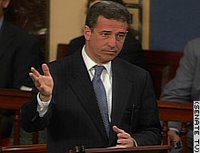 A few words from Senator Russ Feingold on Friday: A few words from Senator Russ Feingold on Friday:
Statement of U.S. Senator Russ Feingold
On the National Intelligence Estimate Released Today
February 2, 2007
“The National Intelligence Estimate on Iraq released today confirms what has been apparent for some time – the Bush Administration’s policy of fighting an indefinite war in Iraq is not working and will not work. The NIE also confirms that what is going on in Iraq is indeed a civil war. We shouldn't ask our brave troops to police a civil war.
“What the Intelligence Community was not asked to do is to find a way out. That’s the job of the policy-makers. Congress must exercise the power of the purse to redeploy U.S. forces from Iraq so that we can refocus our efforts on defeating al Qaeda and other global threats.
“Over the past month, I have asked State Department officials, military generals and the leadership of the Intelligence Community about strategies to deal with the mess this war has created in Iraq as we redeploy our troops. I am deeply concerned that this Administration, which went to war in Iraq without a plan, has no plan for leaving. The failure thus far to develop these strategies is irresponsible.”
From Russ Feingold
How To End The War
Russ Feingold
February 02, 2007
Russ Feingold is a United States senator from Wisconsin.
Our founders wisely kept the power to fund a war separate from the power to conduct a war. In their brilliant design of our system of government, Congress got the power of the purse, and the president got the power of the sword. As James Madison wrote, “Those who are to conduct a war cannot in the nature of things, be proper or safe judges, whether a war ought to be commenced, continued or concluded.”
Earlier this week, I chaired a hearing in the Senate Judiciary Committee to remind my colleagues in the Senate that, through the power of the purse, we have the constitutional power to end a war. At the hearing, a wide range of constitutional scholars agreed that Congress can use its power to end a military engagement.
The Constitution gives Congress the explicit power “[to] declare War,” “[t]o raise and support Armies,” “[t]o provide and maintain a Navy” and “[t]o make Rules for the Government and Regulation of the land and naval Forces.” In addition, under Article I, “No Money shall be drawn from the Treasury, but in Consequence of Appropriations made by Law.” These are direct quotes from the Constitution of the United States. Yet to hear some in the Administration talk, it is as if these powers were written in invisible ink. They were not. These powers are a clear and direct statement from the founders of our republic that Congress has authority to declare, to define and, ultimately, to end a war.
If and when Congress acts on the will of the American people by ending our involvement in the Iraq war, Congress will be performing the role assigned it by the founding fathers—defining the nature of our military commitments and acting as a check on a president whose policies are weakening our nation.
There is plenty of precedent for Congress exercising its constitutional authority to stop U.S. involvement in armed conflict.
Read More At Tom Paine |
 A few words from Senator Russ Feingold on Friday:
A few words from Senator Russ Feingold on Friday: A few words from Senator Russ Feingold on Friday:
A few words from Senator Russ Feingold on Friday:
Comments on "Feingold Friday"
-
 Pam said ... (3:58 PM) :
Pam said ... (3:58 PM) :
post a commentI wish he was running for President.